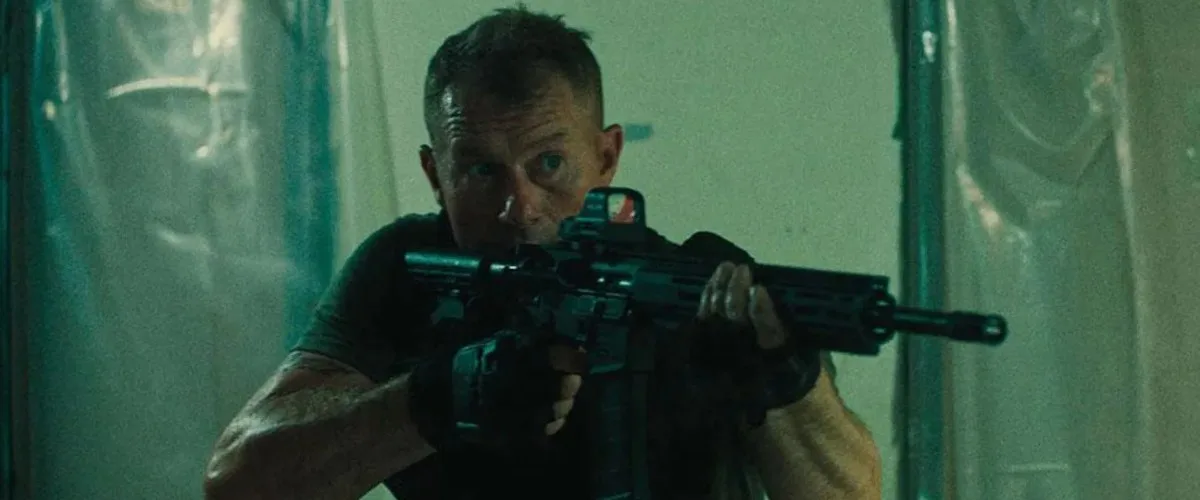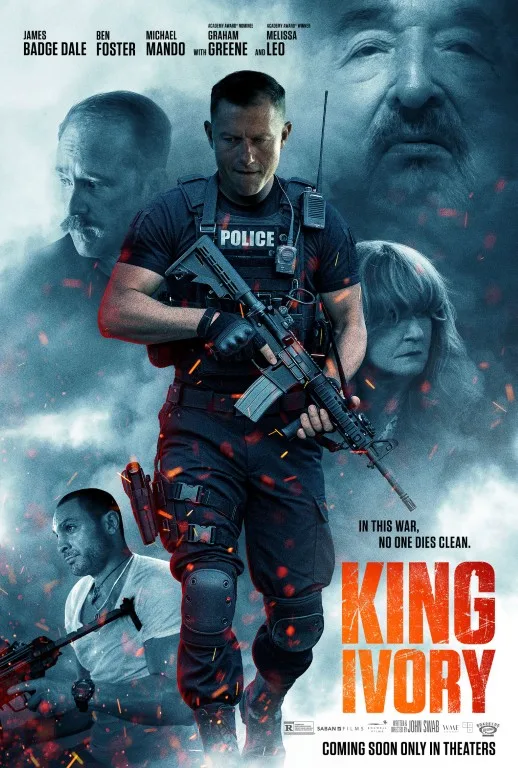An oversized wall of on-screen text helps orient viewers at the start of “King Ivory,” an uninspired, largely monotonous war-on-drugs drama. The movie’s impressionistic visual style and criss-crossing subplots also bear more than a passing resemblance to “Traffic,” an undoubtedly deliberate callback that suggests the only thing that’s changed since 2000 is the drug currently destroying American lives.
But the movie’s square-up introduction tells us why it’s called “King Ivory,” one of a few nicknames for fentanyl. The Mexican cartels’ hierarchy of power has also apparently “decentralized” over the last ten years, so now there are multiple smaller warring drug dealers who control whole regions of America. Some faces may be different now, but it’s still the same drama, ok?
A convoluted, but staid plot begins in prison, where loyal small-timer George Greene (Ben Foster) pulls an Uno Reverse on an extortionate wannabe crime boss by warning an even bigger boss, Holt Lightfeather (MVP Graham Greene), of a scheme to kill him. Lightfeather rewards Greene by expediting his release from prison, on the condition that George helps to clean up a mess involving a rival group of fentanyl pushers led by Ramón Garza (Michael Mando), who’s also caught up in a human trafficking deal that quickly goes awry.
Ramón’s dilemma leads to tension with a crack team of Tulsa drug cops, represented by the righteous, but soft-spoken Layne West (James Badge Dale) and his loyal and sensitive sidekick Ty Grady (George Caroll). Also, Layne’s teenage son Jack (Jasper Jones) and his girlfriend Colby (Kaylee Curry) both take fentanyl, and oh yeah, Ramón is occasionally responsible for Lago (David De La Barcena), a Mexican immigrant who hopes to become a doctor someday. As you might have guessed, Lago doesn’t get to study medicine in “King Ivory.”
You might confuse this movie with an afterschool special if its plot weren’t so busy and its constant handheld camerawork weren’t so frantic. The story’s well stocked with types who rarely distinguish themselves as characters, save for maybe George’s sweaty accomplice Mickey (Ritchie Coster), who’s racist and poor, and gets mocked a few times for it.
Those scenes are kind of amusing, though only if you don’t think too hard about the moral calculus required to make this guy’s apparently shallow bigotry a source of low-brow comedy and not, say, the motivating foibles of any other villains and/or antiheroes.
Some plot twists in this movie are only tragic in the abstract because they’re only important for effect’s sake. Human trafficking victims, for example, or supporting characters who mainly serve to establish the pseudo-naturalistic integrity of the main characters’ world. The bad guys still reaffirm the necessity of the good guys’ cause, and the good guys still conduct themselves in a way that ostensibly reminds us that capable, flesh-and-blood people are doing their best every day to fight an overwhelming battle. Ok, but what specifically about them seems realistic?
Well, the movie looks drab, for starters. It’s bad enough that an underdeveloped scenario reduces almost every sub-plot to hoary tropes and underwhelming dramatic shorthand. It’s even harder to take “King Ivory” seriously in unnecessarily long, visually busy scenes that mainly serve to establish the filmmakers’ intentions of being taken seriously.
Jack’s scenes reduce his addiction to a couple of generic interactions with his peers, which only supports Layne’s stated theory that there’s nothing wrong with his son; he’s just struggling with a hard addiction. Likewise, George’s relatively minor sub-plot eventually makes Mick the focus, presumably because George’s main two traits are that he’s blindly loyal and also has a tracheotomy scar, through which he talks.
Mick’s actions, as well as a wan concluding conversation between Holt and Layne, also suggest that what’s most remarkable here is that the drug business continues seamlessly even with so many competing interests and human errors. So while the movie’s spread-thin style urges us to stay in the moment with barely developed stories and stock plots, the story repeatedly tells us that nothing we’re seeing is remarkable.
Most of what doesn’t work in “King Ivory” would be considerably less frustrating if the dialogue weren’t so much lower-class schtick, like when Mick’s wife (Melissa Leo, of course) tries to soothe him by offering to take him to Benihana. Ty also gets some memorably folksy lines in, too, like when he tries to have a heart-to-heart talk with Jack and only winds up sounding like a rejected “King of the Hill” character (“You’re either jerkin’ off or buildin’ a bomb. Don’t tell me which.”)
These characters still wind up doing exactly what you’d expect of them, even if their respective performers hint at greater depths of humanity that the makers of “King Ivory” simply don’t know how to cultivate. It’s flat, it’s grey, and it only satisfies if you want a sad, familiar mess to look down on.




















